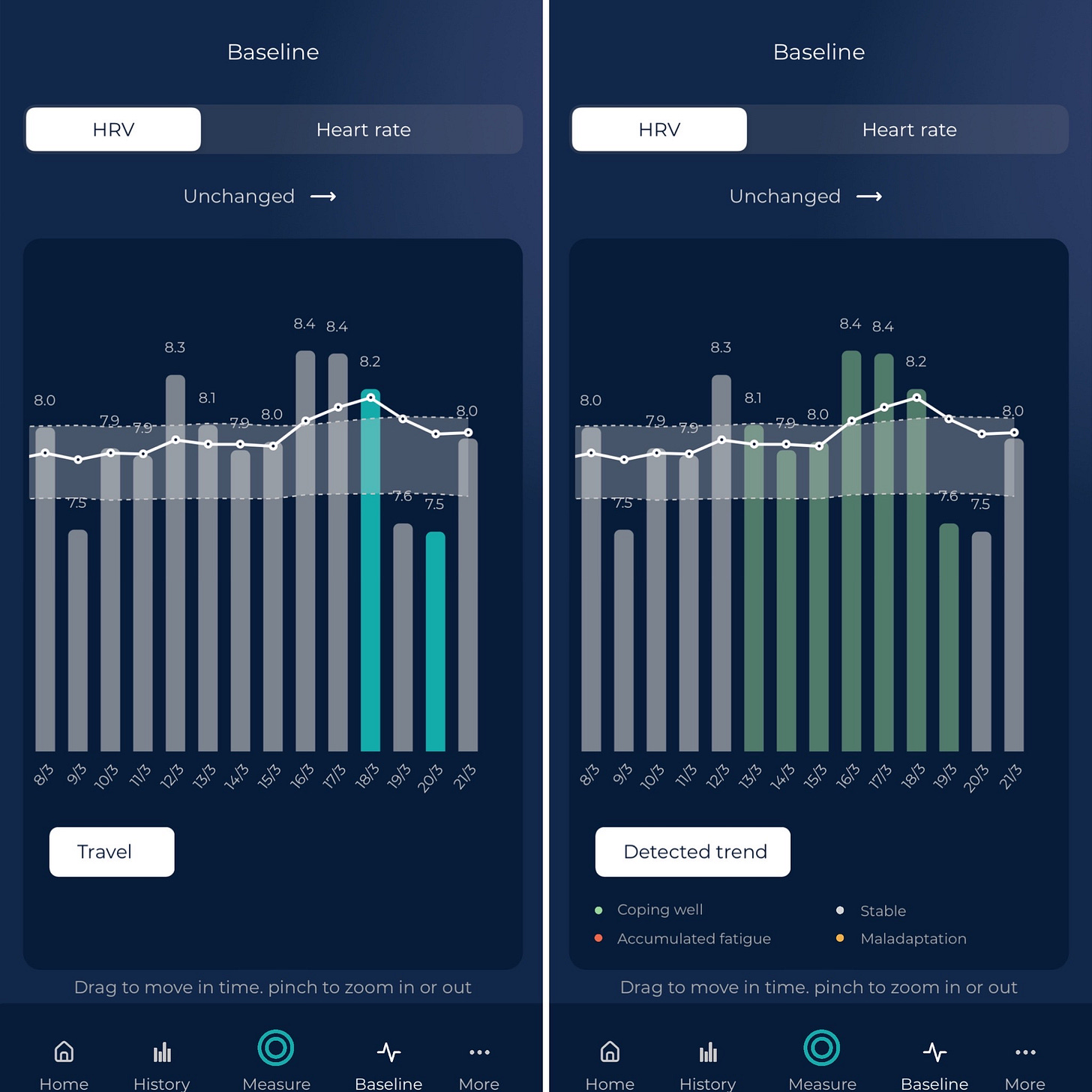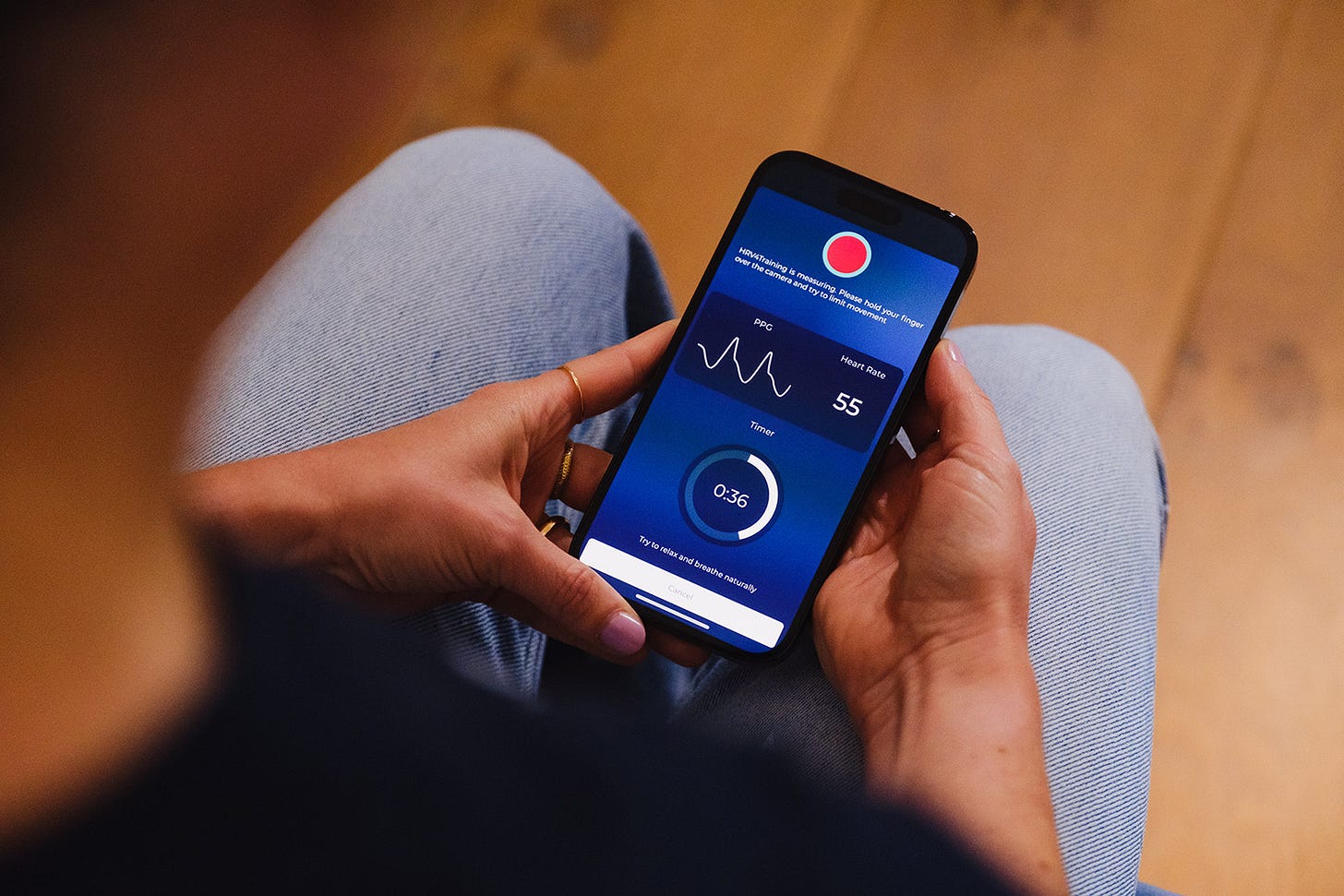Week 02: Caloric Deficit and Heart Rate Variability
A use case for Normalized HRV, which you can find in HRV4Training Pro: https://hrv4training.web.app
hi there 👋
I hope everything is well.
A few weeks ago I wrote a blog about Normalized HRV, introducing a new feature we have released in HRV4Training Pro, where you can look at your HRV normalized by your resting heart rate.
While this type of normalization seems necessary for population-level analysis, at the individual level it is somewhat less clear if we gain more insights by looking at normalized HRV as opposed to just looking at HRV or heart rate in isolation.
In my previous blog, I mentioned how I was going to pay more attention to normalized HRV in my own data and see what considerations I could add.
Well, thanks to a little dieting, I do have some interesting data to report.
In particular, I think it could be more useful to look at normalized HRV in situations in which we have abnormal reductions in resting heart rate.
We’ll see some data soon, but first, let’s add some context.
What to expect with reduced caloric intake?
Common thinking when it comes to a stressor, is that HRV should reduce. This is exemplified by “artificial intelligence” getting it wrong, as shown below:
The reality of caloric deficit is however quite different. Both in the scientific literature and in my own experience, often the opposite happens, i.e. HRV increases, and in particular resting heart rate is highly suppressed, with reduced caloric intake.
There are simple ways to study this, for example, ramadan offers an opportunity to study fasting without forcing people to do anything different from what they’d do anyways, and most ramadan studies do report lower heart rate and increased HRV. Other studies more explicitly targeting caloric deficit, show the same.
Possibly, during a caloric deficit, the body may reduce its metabolism as an energy conservation mechanism, which can also lower heart rate. The body might think you are starving and therefore shift towards energy saving. It is unclear to me if this means higher parasympathetic activity (higher HRV does not mean higher parasympathetic activity), or if it is via other mechanisms, but the result is a marked suppression in resting heart rate, typically. Maybe the change in HRV is just a byproduct of the change in heart rate, something I will discuss again later.
Normalized HRV: a better tool?
Below is my resting heart rate in the past weeks, since I’ve been restricting caloric intake, which is markedly reduced, with a suppression well below my normal range (and well below what I had experienced as acute drops in the past months):

and here is my HRV for the same time period:
According to the data above, I am doing great. Wearables might advise you to go and smash it, due to overly simplistic interpretations of your resting physiology typically used in made-up scores. However, the data above got me thinking. If my resting heart rate is abnormally low and my HRV remains within my normal range, it means that my HRV is in reality reduced, since a lower heart rate means there is more room for variability.
This seems a great case for Normalized HRV, i.e. a way to look at changes in HRV that accounts for how resting heart rate is also changing.
When looking at the data we indeed see that Normalized HRV (which you can pick as HRV:HR in HRV4Training Pro) shows data that better reflects my current situation (i.e. quite tired and low on energy, due to the caloric deficit).

In other cases in which I restricted calories, I dealt better with it than I am currently doing, feeling better and training harder. In those instances, my HRV was abnormally high, as opposed to the current barely normal values. Hence there is information in what HRV is showing, which is not just a change in response to the change in resting heart rate. This means that Normalized HRV would have still been within normal range back then, and not suppressed as shown for this past week, once again reflecting my subjective feeling and capacity to take on additional stress.
Normalized HRV seems a better proxy of our response even at the individual level, and not only at the group level. Food for thought and something to keep experimenting with.
If you use HRV4Training, you can find HRV:HR (Normalized HRV) in HRV4Training Pro, under Overview. If you do not use HRV4Training, maybe it’s time to start.
Thank you for reading and I hope this was informative!
Discount for HRV4Training Pro: 20% off 🖥️
HRV4Training Pro is the ultimate platform to help you analyze and interpret your physiological data, for individuals and teams.
You can find a guide here.
Try HRV4Training Pro for free at HRVTraining.web.app or use promo code SCIENCE for 20% off until the end of the week.
In the app, Pro brings the normal values view, which can help contextualizing longer-term changes, as well as rMSSD on the homepage, see an example below:

See you next week!
Marco holds a PhD cum laude in applied machine learning, a M.Sc. cum laude in computer science engineering, and a M.Sc. cum laude in human movement sciences and high-performance coaching.
He has published more than 50 papers and patents at the intersection between physiology, health, technology, and human performance.
He is co-founder of HRV4Training, advisor at Oura, guest lecturer at VU Amsterdam, and editor for IEEE Pervasive Computing Magazine. He loves running.
Social:









Question: considering you are in a caloric deficit I would suppose that also your last meal of the day is smaller and/or lighter. This improves sleep, lowers HR (the body is less active during the night for digestion) and thus improves recovery (leading probably to higher HRV).
Supposing you were not eating in a really bad way previously, is it possible that the variations you observed are related to the causes I mentioned before? The same observations for a person eating too much or not in a heathy way starting to eat less/better may be similar in quantity but not in quality.
I find the same my HRV sky rockets and RHR decreases while dieting. I got my RHR to 41 at 103kg BW.
Something to add and would love your feedback on.
from 2020 to 2022 while my weight was under 100kg my average HRV was 134ms. This dropped to 93ms after weight gain. For 2023-2024. RHR2 bpm higher than 2020-2022.
So I see the increase in HRV while dieting as a good thing. Even tho I’m more tired.
Many thanks